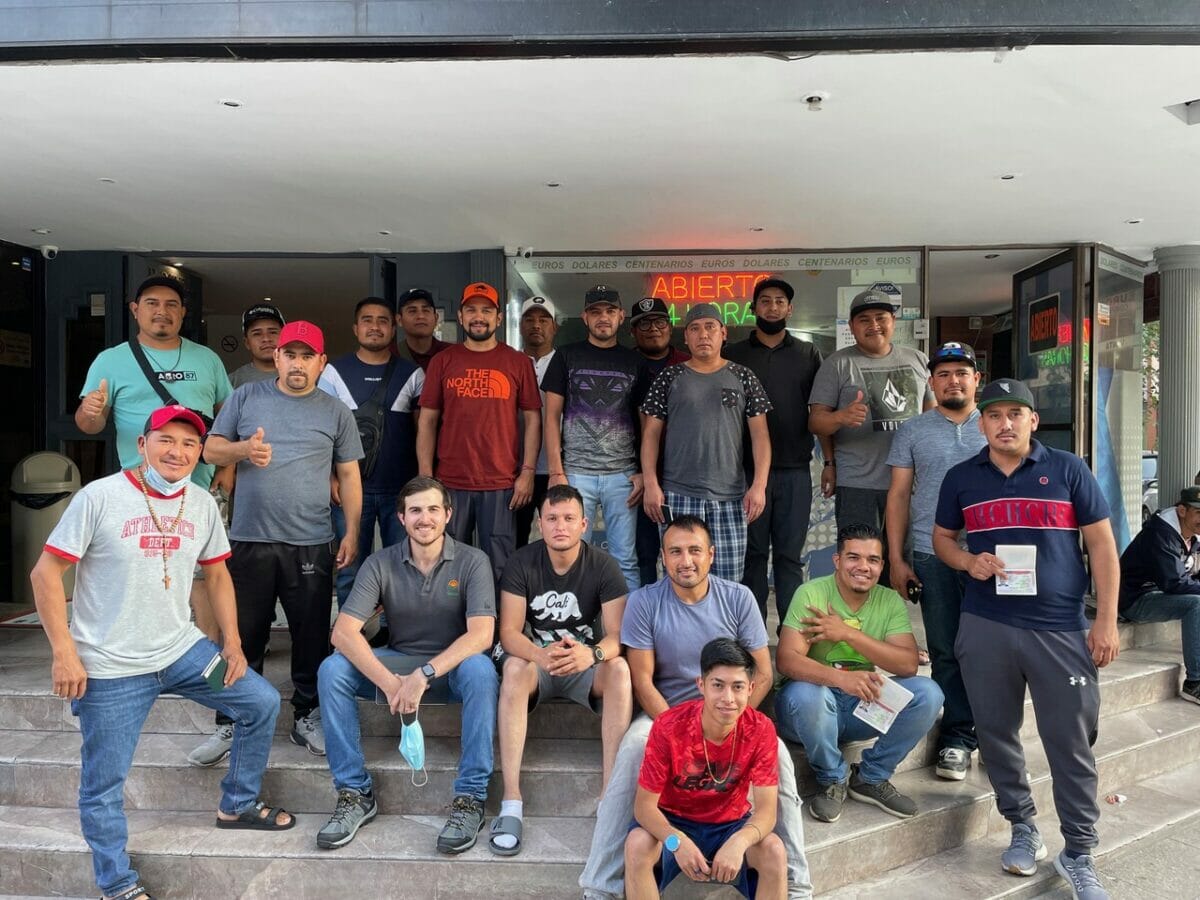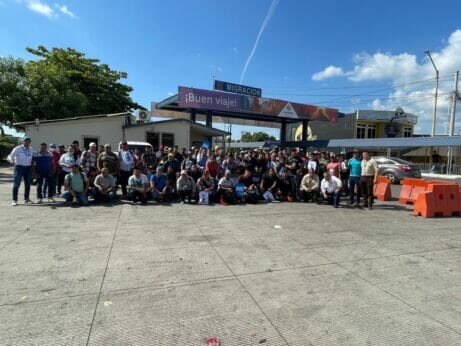Why This Company Says the Popular H-2A Visa is Overdue for a Tech Upgrade
This startup offers a digital solution to streamlining a heavily bureaucratic and abuse-prone farmworker program.
Why This Company Says the Popular H-2A Visa is Overdue for a Tech Upgrade
This startup offers a digital solution to streamlining a heavily bureaucratic and abuse-prone farmworker program.

A group of workers making their way to the US with the help of SESO. courtesy of SESO.
In parts of rural Mexico, there’s a visa that farmworkers treat like gold—yet nobody knows how to get it.
That was the rumor that Marsha Habib heard. The co-owner of Oya Organics in Hollister, a 20-acre organic farm on California’s Central Coast, learned about the cherished H-2A visa three years ago. Faced with a sudden labor shortage in 2019, she and her husband, Modesto Sanchez-Cruz, found themselves considering the federal program, which permits U.S. farms to hire foreign seasonal workers when qualified locals are unavailable.
To the two small-scale farmers, however, the relevant information was confoundingly scarce. “It was something we’d heard about,” recalls Habib, “but didn’t have a clue as to how to apply.”
Fortuitously, her cousin, Michael Guirguis, an entrepreneur with a background in labor policy and economics, stepped in to help. As he unraveled volumes of complicated regulations and a process laden with paperwork, he started developing a digital platform for managing the unwieldy workflow.
Along the way, he turned their bureaucratic quagmire into a golden opportunity by founding SESO, a San Francisco-based startup that streamlines the H-2A program. Given the rapid decline in domestic farmworkers—a trend spurred by an aging workforce and anti-immigration policies—the 37-year-old guest worker program is in desperate need of reform, says Guirguis.
The end-to-end digital platform—a first among the small number of existing H-2A agencies—leads agricultural employers through a complex maze of federal and state labor laws, helping them stay on top of a long compliance checklist. SESO’s modernized solution promises greater transparency and accountability for the antiquated system, one susceptible to employer violations and worker abuse.
In order to ensure an adequate labor force, there’s a heightened need to make the process more efficient, accessible and transparent for both employers and employees alike.
Otherwise, “we’ll be importing more fruits and vegetables,” says Guirguis, “while our crops are left rotting in the fields.”

Labor shortages have long plagued American farms. Between 1950 and 1990, the number of hired and family farmworkers declined by 51 percent and 74 percent, respectively, contributing to $3.3 billion in missed GDP growth in 2012 alone.
From 1942 to 1964, millions of Mexican guest workers helped fill the gap through short-term contracts issued by the Bracero Program. The H-2A program began in 1986, opening the field to other eligible countries—a list that currently totals 81—although more than 90 percent still hail from Mexico. In the past decade, program participation has grown at a steady clip, increasing nearly four-fold in a decade, reaching 275,000 in 2020.
Yet, despite no cap on quota, seasonal guest workers filled only 15 percent of the country’s 2.4 million available farm jobs last year. Critics, including Guirguis, point to the program’s numerous pitfalls. “It’s a complicated, highly fragmented process of working with multiple government agencies and timelines,” he says, with much of it still “done with pen and paper, spreadsheets and filing cabinets.”
And errors and oversight can have costly consequences. In addition to steep fines for violations, administrative delays often result in the late arrival of workers; two years ago, an Oregon farmer lost some $180,000 worth of asparagus while his crew languished for weeks at the U.S.-Mexico border.
H-2A is also rife with worker abuse and exploitation, some of which echo descriptions of its predecessor (the U.S. Department of Labor officer in charge of the Bracero Program ultimately shut it down, calling it “legalized slavery”). Recently, there have been similar accounts of H-2A workers facing brutal labor and housing conditions, wage theft and illegal production quotas, with one recent, high-profile crackdown exposing a human trafficking ring that used H-2A visas to lure thousands of victims to farms in Georgia. Meanwhile, domestic workers have accused employers of displacing them with foreign workers and giving them preferential treatment through better pay and hours.
Most growers, however, simply want to follow the rules, says Daniel Ross, SESO’s in-house compliance attorney. But the rolls of red tape and hyper-technical regulations make it easy for employers to quickly fall out of compliance. “For a farmer who’s focused on raising and getting their crop to market before it spoils, it’s just a mountain of paperwork,” says Ross, noting that the audit-heavy program stipulates a rigid, 48-hour window for compiling documents.
“It would take days to create a paper file that captures all of that information,” he notes. And without proper documentation, “you have no way of proving that you’re in compliance.”
The transparent system also enhances worker protections, assuring workers they will not have to pay recruitment fees or transportation costs (both of which are illegal under H-2A) and allowing direct, fee-free payment transfers. And since closing $25 million in Series A funding last year, SESO opened a Mexico office that helps workers handle immigration logistics, including co-ordinating consulate visits and obtaining the actual visa.
Beyond support in navigating the onboarding process, however, functionality on the worker end is limited to safety videos, detailing employee rights and information on reporting employer violation. Building an actual reporting feature into the interface wouldn’t be “practically possible because of the need to protect [complainant] anonymity,” says Ross. “It’s our responsibility to make sure workers know where and how to report [abuses] and that they know their rights.

Despite bi-partisan support and wide endorsement by farming organizations and advocates, two bills aimed at comprehensive H-2A reform—the Farm Worker Modernization Act and the Affordable and Secure Food Act—failed to pass late last year.
Both called to stabilize the Adverse Effect Wage Rate (AEWR) or the minimum pay rate for H-2A farmworkers. Set annually by the federal government, it can fluctuate dramatically by state—last year, Florida’s increased by 2.7 percent while Pennsylvania’s jumped by 10 percent—and creates budgetary headaches for growers. The proposed fix would have also extended federal domestic farmworker protections to H-2A participants and given them flexibility to prolong or modify their contracts without jeopardizing their visas.
Any meaningful reform needs to bolster the rights of H-2A workers, says Antonio De Loera-Brust, communications director for United Farm Workers (UFW). “Many growers want to streamline the H-2A program to reduce costs,” he notes, yet job safety and welfare are too often sacrificed in the name of efficiency.
Foreign guest workers still lack basic legal protections that are given to domestic counterparts, says De Loera-Brust, noting that they’re excluded from the Migrant and Seasonal Agricultural Worker Protection Act, which stipulates health and safety standards. “In a system where your visa and housing are dependent on your employer, it’s far too easy for bad actors to get away with abuse,” he says. “We want to make sure that H-2A workers are not the next iteration of the Bracero program.”
Last year, the Department of Labor issued several program amendments; while falling far short of comprehensive reform, they do increase some wage, housing and transportation protections, as well as employer accountability. Ultimately though, ensuring compliance is key to worker welfare, says Guirguis—and automating and digitizing the heavy paper trail leaves “much less potential for oversight and abuse.”
“There’s an incredible amount of institutional knowledge baked into [SESO’s] technology,” says Tyler Rodrigue, CEO of Noble Vineyard Management in Ukiah, California. As a licensed farm labor contractor, his company relies on the platform to make H-2A hires for more than 55 small and family-owned vineyards in Northern California.
Rodrigue acknowledges the high costs of hiring H-2A workers: Along with housing and transportation, his entire crew—both foreign and domestic—is entitled to the AEWR. And because California’s rate is higher than its state minimum wage, it increases expenses by almost a third. “But this program allows us to do hiring right,” he says, noting that the near-85-percent worker return rate reflects the well-placed efforts.
Between drought, the pandemic and flooding, farmers have enough to battle, adds Oya Organic’s Habib. “So, not needing to worry about whether we’ll be able to find enough labor is a huge relief.”
Follow us
This work is licensed under a Creative Commons Attribution-NoDerivatives 4.0 International License.
Want to republish a Modern Farmer story?
We are happy for Modern Farmer stories to be shared, and encourage you to republish our articles for your audience. When doing so, we ask that you follow these guidelines:
Please credit us and our writers
For the author byline, please use “Author Name, Modern Farmer.” At the top of our stories, if on the web, please include this text and link: “This story was originally published by Modern Farmer.”
Please make sure to include a link back to either our home page or the article URL.
At the bottom of the story, please include the following text:
“Modern Farmer is a nonprofit initiative dedicated to raising awareness and catalyzing action at the intersection of food, agriculture, and society. Read more at <link>Modern Farmer</link>.”
Use our widget
We’d like to be able to track our stories, so we ask that if you republish our content, you do so using our widget (located on the left hand side of the article). The HTML code has a built-in tracker that tells us the data and domain where the story was published, as well as view counts.
Check the image requirements
It’s your responsibility to confirm you're licensed to republish images in our articles. Some images, such as those from commercial providers, don't allow their images to be republished without permission or payment. Copyright terms are generally listed in the image caption and attribution. You are welcome to omit our images or substitute with your own. Charts and interactive graphics follow the same rules.
Don’t change too much. Or, ask us first.
Articles must be republished in their entirety. It’s okay to change references to time (“today” to “yesterday”) or location (“Iowa City, IA” to “here”). But please keep everything else the same.
If you feel strongly that a more material edit needs to be made, get in touch with us at [email protected]. We’re happy to discuss it with the original author, but we must have prior approval for changes before publication.
Special cases
Extracts. You may run the first few lines or paragraphs of the article and then say: “Read the full article at Modern Farmer” with a link back to the original article.
Quotes. You may quote authors provided you include a link back to the article URL.
Translations. These require writer approval. To inquire about translation of a Modern Farmer article, contact us at [email protected]
Signed consent / copyright release forms. These are not required, provided you are following these guidelines.
Print. Articles can be republished in print under these same rules, with the exception that you do not need to include the links.
Tag us
When sharing the story on social media, please tag us using the following: - Twitter (@ModFarm) - Facebook (@ModernFarmerMedia) - Instagram (@modfarm)
Use our content respectfully
Modern Farmer is a nonprofit and as such we share our content for free and in good faith in order to reach new audiences. Respectfully,
No selling ads against our stories. It’s okay to put our stories on pages with ads.
Don’t republish our material wholesale, or automatically; you need to select stories to be republished individually.
You have no rights to sell, license, syndicate, or otherwise represent yourself as the authorized owner of our material to any third parties. This means that you cannot actively publish or submit our work for syndication to third party platforms or apps like Apple News or Google News. We understand that publishers cannot fully control when certain third parties automatically summarize or crawl content from publishers’ own sites.
Keep in touch
We want to hear from you if you love Modern Farmer content, have a collaboration idea, or anything else to share. As a nonprofit outlet, we work in service of our community and are always open to comments, feedback, and ideas. Contact us at [email protected].by Naoki Nitta, Modern Farmer
February 15, 2023
Modern Farmer Weekly
Solutions Hub
Innovations, ideas and inspiration. Actionable solutions for a resilient food system.
ExploreExplore other topics
Share With Us
We want to hear from Modern Farmer readers who have thoughtful commentary, actionable solutions, or helpful ideas to share.
SubmitNecessary cookies are absolutely essential for the website to function properly. This category only includes cookies that ensures basic functionalities and security features of the website. These cookies do not store any personal information.
Any cookies that may not be particularly necessary for the website to function and are used specifically to collect user personal data via analytics, ads, other embedded contents are termed as non-necessary cookies.
Great article! Yeap, we need make the process more efficient, accessible and transparent for both employers and employees alike to ensure an adequate labor force.
As a dedicated Welder and Machine Operator, I’m eager to bring my expertise to the modern farming community. I’m not just here to contribute my skills; I’m also excited to learn from the incredible people in this industry. If a generous farmer is willing to sponsor me, you have my word that my commitment to honesty and integrity is unwavering at 100%. Let’s build a brighter and more efficient future together!
Readers beware: This article is a mix of hype and misinformation. First of all, SESO is a tech startup that is actively raising capital and clearly hoping to cash in on the government’s intention to greatly expand a guestworker program that is widely condemned by worker organizations. SESO claims that the expense of the program is related to government bureaucracy–actually, much of the expense of the program is due to middlemen recruiters, like SESO, who charge exorbitant fees for recruiting and transporting workers. Second of all, the H-2A guestworker program by its very nature violates basic tenets of human rights… Read more »